
The Indian stock markets are currently seeing one of their biggest bull runs and are further expected to surge after the general elections in 2024. However, there are always a few sceptics who are just waiting for the other shoe to fall. These are generally risk-averse investors who want to participate in stock markets but are afraid to take the risk. The bond market becomes a classic choice of investment option for such investors to gain good returns at the same time reduce the overall risk exposure. Are you too seeking to invest in bonds? Check out this blog to learn all about bonds and the bond market before taking the plunge.
Read More: BSE - All you need to know
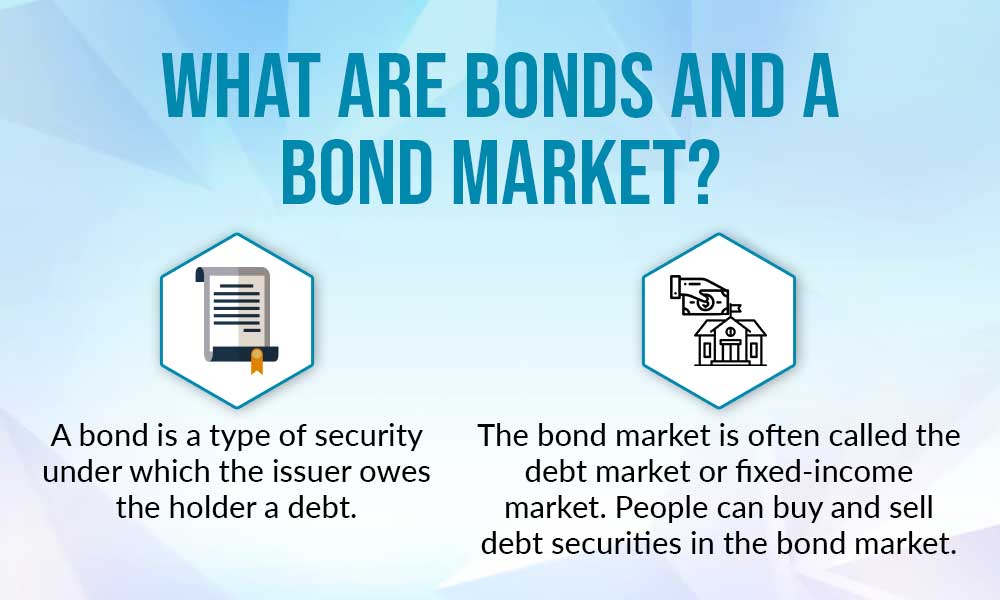
Before we dive into the bond market, let us understand the meaning of the term ‘Bonds’.
Bonds are essentially debt securities issued by governments, municipalities, or corporations to raise capital. Bonds are issued at a fixed or floating rate of interest (disclosed at the time of issuing the bond) with a fixed maturity date upon which the bonds are redeemed by the issuer at the agreed price. By purchasing a bond, the investor is essentially lending money to the issuer of the bond in return for a fixed coupon payment or interest payment at periodic intervals along with the assurance of return of capital at the time of maturity of the bond. Bonds are therefore considered relatively safer investments compared to stocks as they offer predictable returns and a guaranteed repayment of the principal amount at maturity. This makes them a preferred investment option for risk-averse investors or investors looking to hedge the overall risk of their investment portfolio.
The bond market plays a crucial role in providing financing for both the government and corporations. It serves as a crucial platform where bonds are bought and sold among various participants, including individual investors, institutional investors, and financial institutions. It functions as a decentralised marketplace, facilitating the raising of capital for issuers while providing investors with opportunities to diversify their portfolios and generate income through interest payments. This dynamic market is influenced by several factors, including interest rates, credit ratings, economic conditions, and investor sentiment.
The bond market comprises two main segments, namely, the primary market and the secondary market. The primary market allows issuers to raise capital by directly selling bonds to investors through public offerings or private placements. The prices of these bonds and the terms of issue are pre-determined at the time of issue of bonds in the primary market. Meanwhile, the secondary market facilitates the trading of bonds among the participants. This provides liquidity and price discovery allowing the investors to buy and sell bonds even after their issue.
Here is a list of key terms associated with bonds and the bond market that help in a better understanding of security and its investment.
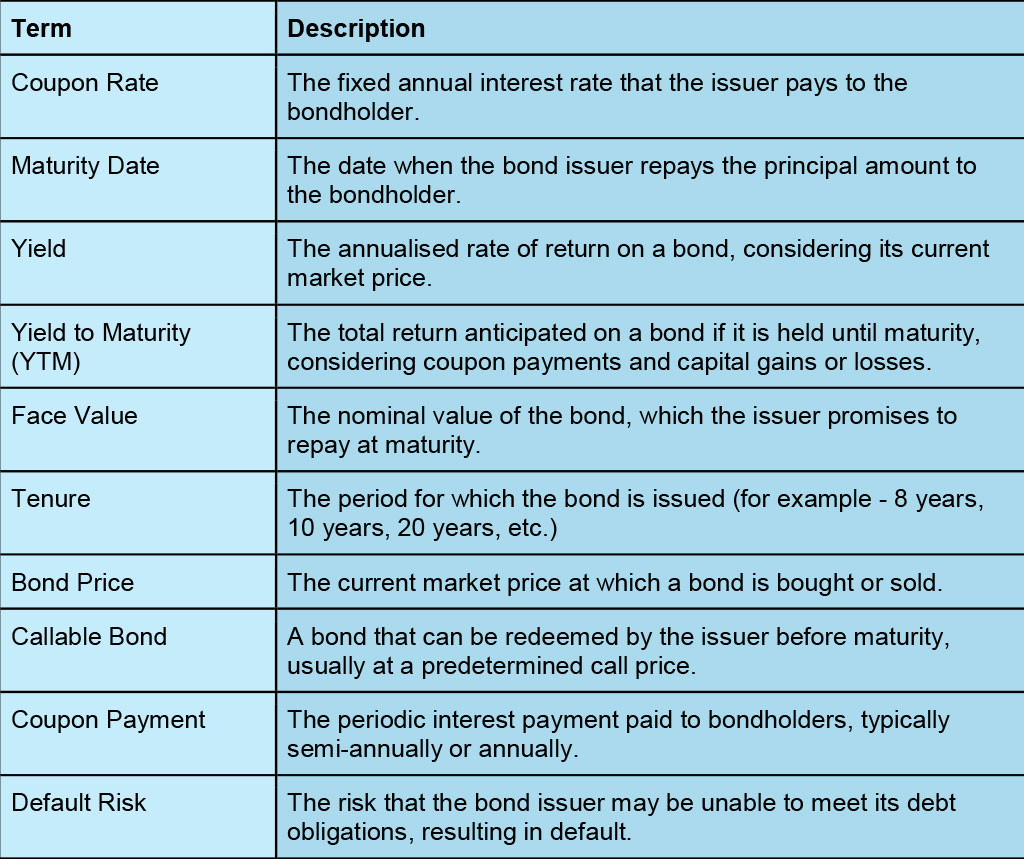
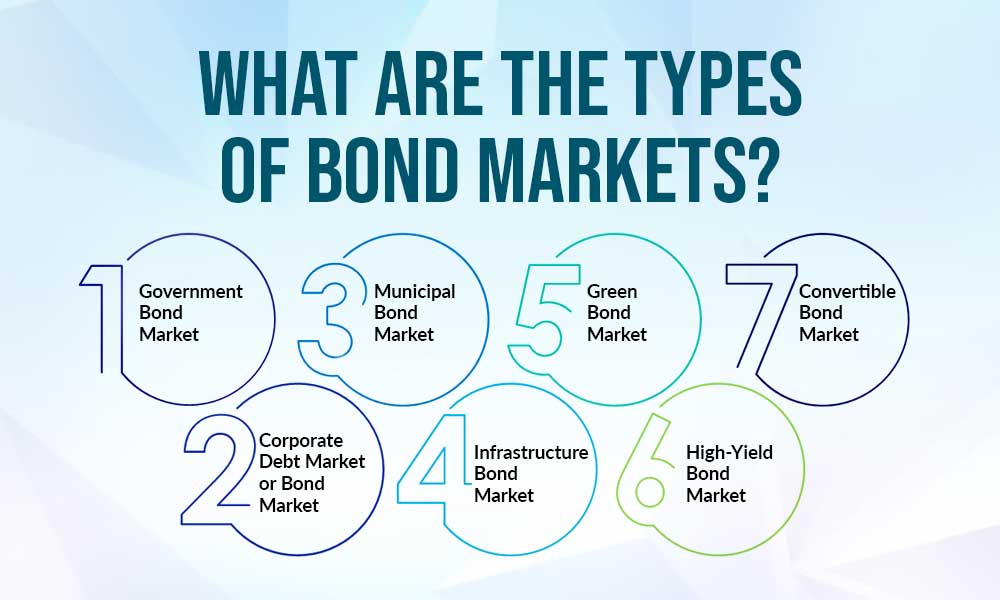
The bond market in India is made of various segments which cater to the specific needs of issuers and investors. The various types of bond markets in India are explained hereunder.
The government bond market comprises securities issued by the central and state governments to finance budgetary deficits and infrastructure projects. These bonds, also known as G-Secs, are considered the safest investments or risk-free investments as they are fully backed by the government. Investors in government bonds benefit from regular interest payments (usually in the range of 7% to 10% depending on the type of bond) and the assurance of timely principal repayment at maturity. These bonds are issued for varying tenures often ranging from 2 years to 40 years. Some of the popular types of government bonds include fixed-rate bonds, floating-rate bonds, Sovereign Gold Bonds, Inflation-Indexed Bonds, 7.75% GOI Savings Bonds, Zero-Coupon Bonds and more.
The corporate bond market involves bonds issued by corporations to raise capital for business expansion, acquisitions, or debt refinancing. These bonds vary in credit quality and risk, depending on the issuing corporation's financial health and industry prospects. Corporate bonds offer higher yields compared to government bonds, reflecting the additional risk associated with corporate issuers. Investors in the corporate bond market must assess credit ratings, financial statements, and market conditions to make informed investment decisions. The corporate bond market in India has witnessed significant growth in recent years, driven by regulatory reforms and increased investor demand for fixed-income securities.
The municipal bond market comprises bonds issued by local governments, municipalities, and urban local bodies to finance public infrastructure projects such as roads, bridges, schools, and hospitals. Municipal bonds offer tax advantages to investors, as interest income earned from these bonds is typically exempt from income tax. The municipal bond market in India is relatively nascent but holds potential for development, providing a source of financing for local government projects while offering investment opportunities to individuals seeking tax-efficient returns.
The infrastructure bond market focuses on bonds issued by infrastructure companies and special purpose vehicles (SPVs) to fund infrastructure development projects such as power plants, highways, airports, and ports. Infrastructure bonds play a crucial role in mobilising long-term capital for infrastructure projects, contributing to economic growth and development. Investors in infrastructure bonds evaluate project viability, regulatory frameworks, and credit risk to assess investment prospects and potential returns. The infrastructure bond market in India presents opportunities for investors to participate in the country's infrastructure growth story while diversifying their investment portfolios.
The green bond market involves bonds issued to finance environmentally sustainable projects and initiatives aimed at mitigating climate change, promoting renewable energy, and enhancing environmental conservation efforts. Green bonds adhere to international standards and guidelines, such as the Green Bond Principles (GBP) and Climate Bonds Initiative (CBI), ensuring transparency, accountability, and impact measurement. Investors in green bonds prioritise environmental, social, and governance (ESG) considerations, assessing project eligibility, impact metrics, and reporting standards to support sustainable investing practices. The green bond market in India is gaining traction, driven by increasing awareness of environmental issues, regulatory support, and investor demand for sustainable investment opportunities.
The high-yield bond market, also known as the junk bond market, involves bonds issued by corporations with lower credit ratings or higher perceived risk of default. These bonds offer higher yields to compensate investors for the increased risk of investing in companies with weaker financial profiles. High-yield bonds typically finance mergers and acquisitions, corporate restructuring, or expansion plans for companies that may not qualify for investment-grade ratings. It is essential to evaluate the credit risk, industry dynamics, and market conditions to assess investment opportunities and potential returns for investment in these bonds. High-yield bonds carry higher default risk but they also offer the potential for enhanced yield and portfolio diversification which is suitable for more dynamic or aggressive investors of the bond market.
The convertible bond market involves bonds that can be converted into a predetermined number of common stock shares of the issuing company at the bondholder's discretion. Convertible bonds offer investors the opportunity to participate in potential equity upside while providing downside protection through fixed-income characteristics. These bonds are typically issued by growth-oriented companies seeking to raise capital without diluting existing shareholders or increasing debt levels. Investors in convertible bonds evaluate conversion terms, bond valuation, and equity conversion premiums to assess investment attractiveness and risk-return profiles. The convertible bond market in India provides a unique investment avenue for investors seeking exposure to both fixed-income and equity securities within a single instrument.
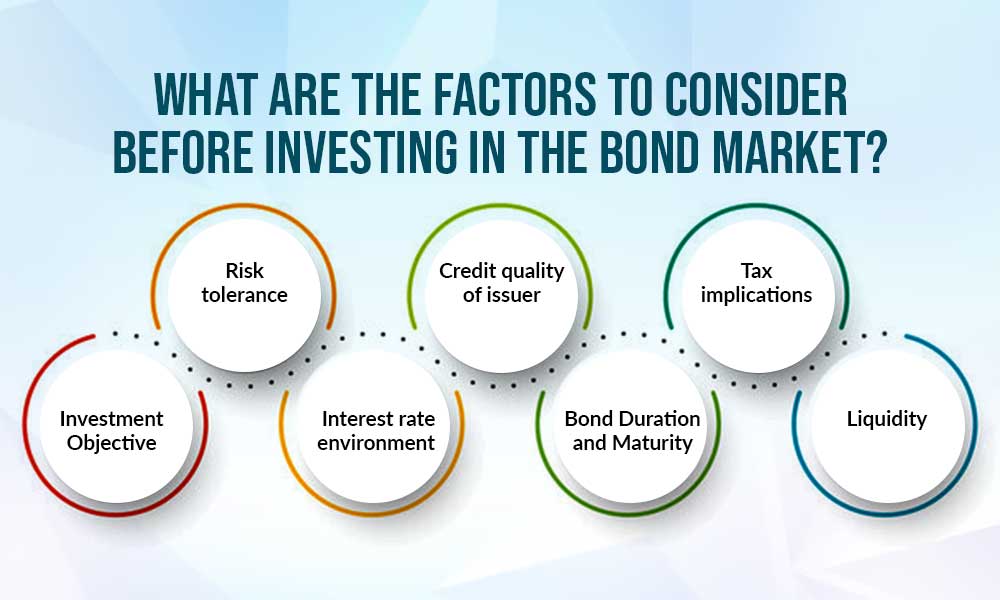
Some of the factors that are essential to consider while investing in the bond market are highlighted hereunder.
One of the primary factors to consider while investing in the bond market is the purpose of investment which can be capital preservation, income generation or diversification of the investment portfolio. This evaluation helps in determining the optimum type of bond for investment which aligns with the risk assessment and the purpose of investment too.
Another crucial factor is the risk tolerance. While bonds are relatively of lower risk as compared to equities and other investment options, they do carry a certain amount of risk (except Government bonds). Therefore, a proper risk assessment allows the investor to choose the optimum bond and the tenure for investment.
The prevailing interest rate environment provides insight into the current coupon rates and the impact of future interest rate fluctuations on the bond yield. Therefore, it is essential to evaluate the interest rate environment before investing in bonds.
The credit quality of the issuer refers to the risk of default. The higher the credit rating, the lower the risk of default by the issuer of the bond. Investors should therefore focus on the credit rating of the bond issuer before investing in the same.
The bond duration is the measure of the bond’s sensitivity to the changes in the interest rates. Therefore, it is essential to evaluate the bond duration and its maturity to assess the impact of interest rate fluctuations, Short term bonds are less sensitive to interest rate changes while long-term bonds are more sensitive to interest rate fluctuations.
Investment in bonds, especially government bonds, provides multiple tax benefits in the form of tax exemptions on the interest earned or the corpus received at the time of redemption of the bond. This makes it another crucial factor impacting investment in bonds.
Although bonds come with a fixed tenure, they can be sold or liquidated in the secondary market before their maturity. Therefore, investors seeking to liquidate their holdings before the maturity of the bond should also consider its liquidity at the time of investment in such bonds.
After understanding the various details of bonds and the bond market, it is time to understand the advantages and the risks of investing in the bond market. Here is a brief understanding of the same.
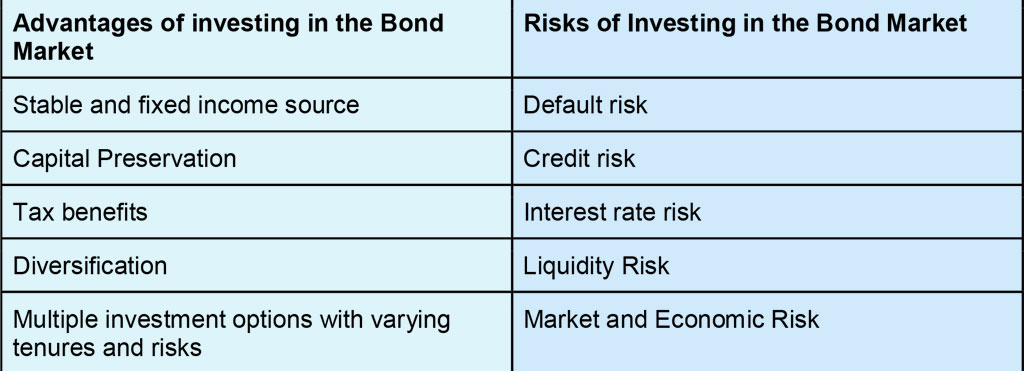
The Indian bond market is an important pillar of the economy and is mainly dominated by government bonds. The ease of investment and the multiple benefits make them a preferred choice despite the lower earning potential than the equity markets in the long run. The Indian bond market is said to further increase in the coming years given the government's push for infrastructure and the increasing demand from retail investors for stable income sources from the stock markets.
This article was a brief analysis of the bond market in India and its related details. Let us know if you need more information on any type of bond and we will address it soon.
Till then Happy Reading!
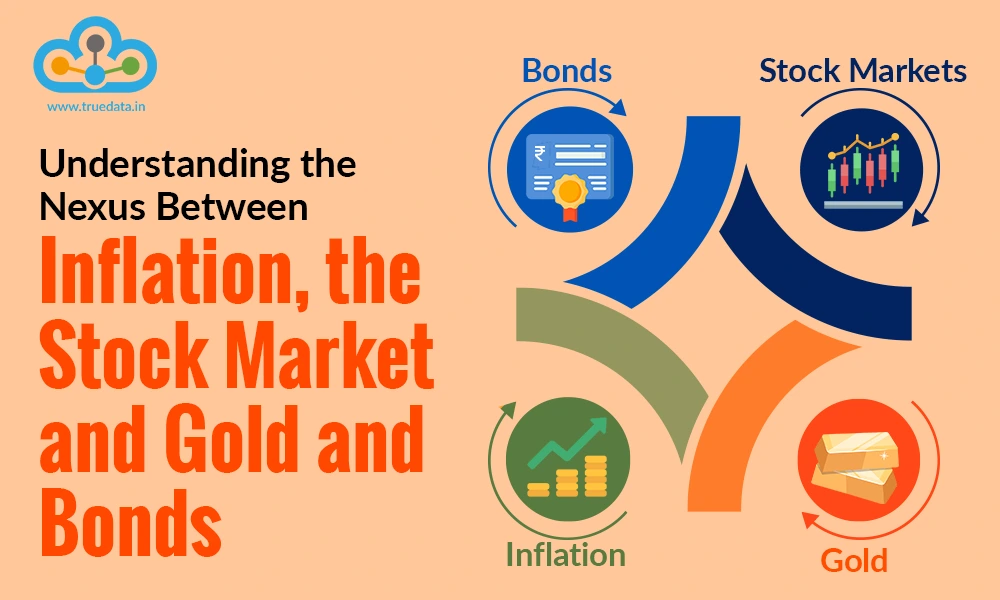
Imagine a time when you could get 10gms of gold at Rs. 100 or a Reliance Industr...

When a person talks about investing their funds, the most obvious choices for i...

The relationship between gold and Indian households is legendary and ancient as...